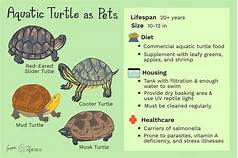What Do Pet Turtles Need?
Bringing a pet turtle into your home can be a rewarding experience, but it's important to make sure you have everything your new friend needs to thrive. Here are some essential things to consider when caring for a pet turtle:

Habitat
1. Size: The size of your turtle's habitat should be appropriate for its species and size. Most turtles require a minimum of 10 gallons of water per inch of their shell length. 2. Substrate: The substrate, or material at the bottom of the habitat, should be safe for your turtle to walk on and burrow in. Some good options include coconut fiber, cypress mulch, and reptile carpet. 3. Hiding Places: Turtles need places to hide to feel safe and secure. Provide your turtle with several hiding places, such as caves, rocks, or overturned flowerpots.
Water
1. Clean Water: Turtles need clean water to swim, drink, and soak in. Change the water in your turtle's habitat at least once a week, or more often if it becomes dirty. 2. Water Temperature: The water temperature should be appropriate for your turtle's species. Most turtles prefer water temperatures between 75 and 85 degrees Fahrenheit. 3. Water Depth: The water should be deep enough for your turtle to swim and submerge its entire body, but not so deep that it can't reach the surface to breathe.
Food
1. Variety: Turtles are omnivores and need a variety of foods to stay healthy. Offer your turtle a variety of fresh vegetables, fruits, pellets, and insects. 2. Supplements: Turtles also need calcium and vitamin D supplements to stay healthy. Follow the instructions on the supplement package for how much to give your turtle. 3. Feeding Schedule: Feed your turtle once or twice a day. The amount of food you give your turtle will depend on its size, species, and activity level.
Lighting
1. UVB Lighting: Turtles need UVB lighting to synthesize vitamin D, which is essential for calcium absorption and bone health. Provide your turtle with a UVB bulb that covers at least two-thirds of the habitat. 2. Heat Lighting: Turtles also need a heat lamp to maintain a proper temperature in their habitat. The temperature in the basking area should be between 90 and 100 degrees Fahrenheit. 3. Lighting Schedule: Turtles need 12 hours of light and 12 hours of darkness each day. Use a timer to regulate the lighting in your turtle's habitat.
Health Care
1. Regular Checkups: Take your turtle to the vet for regular checkups to ensure it's healthy. 2. Quarantine: If you're introducing a new turtle to your home, quarantine it for at least 30 days to prevent the spread of disease. 3. Common Health Problems: Some common health problems in turtles include respiratory infections, shell rot, and digestive problems. If you notice any signs of illness in your turtle, take it to the vet right away.
Declaration: All article resources on this website, unless otherwise specified or labeled, are collected from online resources. If the content on this website infringes on the legitimate rights and interests of the original author, you can contact this website to delete it.




